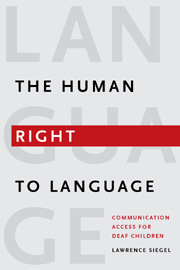|
Communication Access for Deaf Children
Lawrence M. Siegel Now in Paperback! View the table of contents. $49.95s print edition |
Shopping Cart Operations
Add to Cart |
From the Review of Disability Studies: An International Journal
In 1982, the United States Supreme Court ruled against Amy Rowley, a deaf six-year-old, who was seeking the right to sign language interpretation in her public school classroom. Siegel, founder and director of the National Deaf Education Project and a special education attorney in San Francisco, disagrees with this decision since it denies deaf and hard of hearing children what virtually every other American child takes for granted: the right to receive and express thought and to cultivate his or her preferred language in school. This is a situation impossible to accept, and Siegel therefore contends the U.S. Constitution should protect every deaf and hard of hearing child’s right to communication and language as part of an individual’s right to freedom and equality. Furthermore, he insists with force and solid documentation that this is a basic human rights issue. In this, he is in line with Linda Komesaroff’s argument and points of view in Disabling Pedagogy. This is, however, a reading that is as equally depressive as Komesaroff’s book, since the Rowley decision remains “the law of the land,” as Siegel puts it. But how can this be, and what can be done? These are the main questions this book raises and partly answers.
The book is written in a highly accessible style and introduces the reader to the grave injustice deaf and hard of hearing children are exposed to in the U.S. school system. Siegel argues and documents with force that when a deaf or hard of hearing child sits alone in a crowded classroom and is unable to access the rich and varied communication around her, the child is denied any chance for success in life.
A clue for understanding the lack of access to communication and language is that the common notion of a right to “speech” is too frequently interpreted narrowly as the right to use one’s voice. In this rather phonocentric atmosphere, it is hard to get through with the broader understanding of the right to receive and transmit information in all ways, including visually through sign language.
Siegel reveals there are no judicial decisions or laws that recognize this missing right, and he offers a legal and constitutional strategy for change. By providing many examples of deaf children with inadequate communication access in school, he makes a compelling case for changing the status quo. One can, as Siegel insists, hope things will change as they did for African Americans through the well known Brown v. Board of Education court case in 1954. Before 1954, “the law of the land” was thoroughly racist and segregationist and considered “natural” and “normal.” And if that status quo could be questioned and finally overcome, can the same happen for deaf and hard of hearing children in school?
The strength of Siegel’s The Human Right to Language is that it challenges the U.S. legal system but with a potential global scope. I would recommend reading it together with Disabling Pedagogy because the two books complement one another in a rather empowering way. Both give reasons for fighting for changes both in the legal and the educational system. It seems plausible that both strategies must be pursued together if any major change shall be attained.
Lawrence M. Siegel is the founder of ForWords and an attorney in San Francisco, CA.
Print Edition: ISBN 978-1-56368-591-0, 6 x 9 paperback, 180 pages
$49.95s
E-Book: ISBN 978-1-56368-421-0
$49.95
To order by mail, print our Order Form or call:TEL 1-800-621-2736; (773) 568-1550 8 am - 5 pm CST
TTY 1-888-630-9347
FAX 1-800-621-8476; (773) 660-2235
